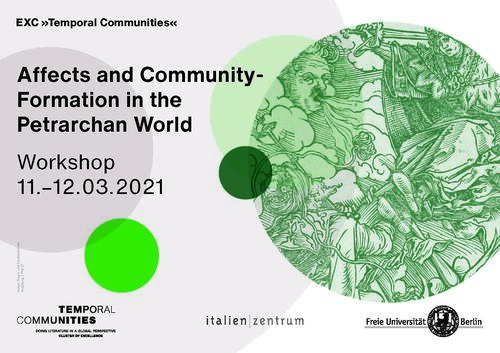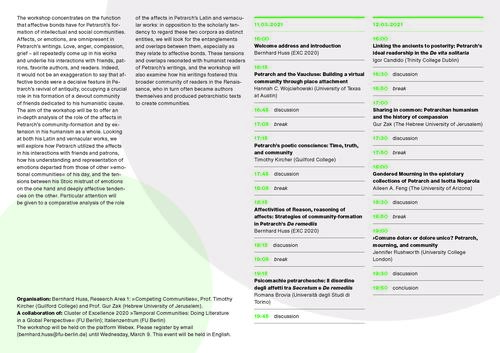Internationaler Workshop
Organisation: Timothy Kircher (Guilford College), Gur Zak (The Hebrew University of Jerusalem / Fellow at EXC 2020) und Bernhard Huss
Weitere Teilnehmer*innen: Romana Brovia (Università degli Studi di Torino), Igor Candido (Trinity College Dublin), Aileen A. Feng (The University of Arizona), Jennifer Rushworth (University College London) und Hannah C. Wojciehowski (The University of Texas at Austin)
In italienischer und englischer Sprache
In Zusammenarbeit mit EXC 2020 "Temporal Communities"
The workshop concentrates on the function that affective bonds have for Petrarch’s formation of intellectual and social communities. Affects, or emotions, are omnipresent in Petrarch’s writings. Love, anger, compassion, grief – all repeatedly come up in his works and underlie his interactions with friends, patrons, favorite authors, and readers. Indeed, it would not be an exaggeration to say that affective bonds were a decisive feature in Petrarch’s revival of antiquity, occupying a crucial role in his formation of a devout community of friends dedicated to his humanistic cause. The aim of the workshop will be to offer an in-depth analysis of the role of the affects in Petrarch’s community-formation and by extension in his humanism as a whole. Looking at both his Latin and vernacular works, we will explore how Petrarch utilized the affects in his interactions with friends and patrons, how his understanding and representation of emotions departed from those of other “emotional communities” of his day, and the tensions between his Stoic mistrust of emotions on the one hand and deeply affective tendencies on the other. Particular attention will be given to a comparative analysis of the role of the affects in Petrarch’s Latin and vernacular works: in opposition to the scholarly tendency to regard these two corpora as distinct entities, we will look for the entanglements and overlaps between them, especially as they relate to affective bonds. These tensions and overlaps resonated with humanist readers of Petrarch’s writings, and the workshop will also examine how his writings fostered this broader community of readers in the Renaissance, who in turn often became authors themselves and produced petrarchistic texts to create communities.


